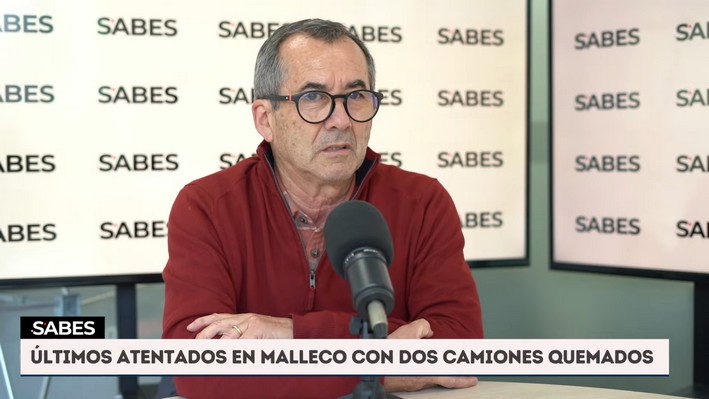The manager of the Association of Forestry Contractors Acoforag, René Muñoz, warned about the normalization of rural violence in the Southern Macrozone, particularly in La Araucanía, and criticized the lack of concrete actions by the State to protect both company assets and the safety of forestry workers.
In an interview with Sabes.cl, Muñoz lamented that attacks have become part of the news landscape: "Terrorist activity has been normalized; it's reported as just another news item, but it doesn’t significantly influence the decisions authorities should make. We have constantly protested the impact on workers, who are the most affected, along with their families."
The industry leader emphasized that it's not just about material losses. "Here, equipment losses usually make the headlines, but the unarmed forestry worker facing groups armed with rifles is the one who suffers the most," he added.
Faced with this scenario, Muñoz expressed support for a more active role of the Armed Forces in the area: "Carabineros has learned a lot over these 12 years, but they are not trained to handle rural guerrilla warfare. They are prepared for public order, not armed conflict in rural areas. That’s why we believe a different kind of force is needed, or at least military personnel specifically trained for this type of confrontation."
Forestry sector under pressure
Muñoz also addressed the lack of conditions for the forestry sector's development in the country. "There’s no forestry country in the world where what happens here occurs. Large companies look to Brazil, where they get railways, fiber optics, and airstrips right at the industry's doorstep. We don’t have that certainty in Chile. Here, we work under constant threats," he stated.
Land and stalled dialogue
Regarding the land restitution process for Mapuche communities promoted by the Commission for Peace and Understanding, Muñoz expressed skepticism: "What exists is a dialogue of the deaf. Companies are willing to hand over the 10,000 hectares claimed with land titles, but they fear this will open the door to unlimited new demands. Until this discussion is resolved, the conflict will continue."
He also questioned the effective use of the returned lands: "Of the 260,000 hectares restituted so far, more than half are abandoned. There’s no technical or financial support for these communities to develop the territories. If you hand over land without backing, it leads to nothing."
When asked about the perspective of indigenous peoples, Muñoz acknowledged differing interpretations: "They may consider environmental conservation as land use, but the data we handle shows that much of this land has no use at all, not even environmental."
State insurance against attacks
Regarding guarantees for operating in high-risk zones, Muñoz highlighted the existence of a state-backed insurance secured after the 2022 protests: "Today, we have total loss insurance with no deductibles, covering over 75% of equipment. It’s the only thing we have, and it has worked well, but we fear a change in government could eliminate it."
The Acoforag manager concluded with a call to recognize the severity of the problem: "The violence hasn’t disappeared; it has just become chronic. And without a real, coordinated effort to address it, the forestry sector will continue operating under threat."
The full interview on Sabes' YouTube channel:
https://www.youtube.com/live/fmwU-4w71QE?si=PcUB6mcuYsjj2r_L







Comments (0)
No comments yet. Be the first to comment!
Leave a comment